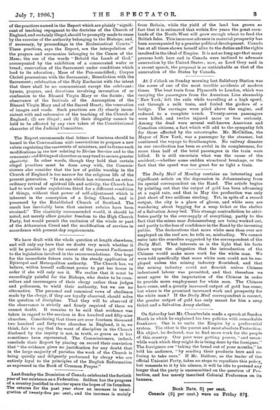We have dealt with the whole question at length elsewhere,
and will only say here that we doubt very much whether it will be possible to get the assent of the present Parliament to the legislation involved in the recommendations. Our hope for the immediate future rests in the steady application of Episcopal and Metropolitan authority. The Church has, we believe, within herself sufficient power to put her house in order if she will only use it. We realise that it must be exceedingly painful for the Bishops, who desire to be coun- sellors and encouragers of their clergy rather than judges and policemen, to wield their authority, but we see no alternative. The personal and canonical vows of obedience made by the clergy, if they are loyally observed, should solve the question of discipline. That they will be observed if the observance is strictly and firmly required of them we cannot doubt. It remains to be said that evidence was taken in regard to the services in five hundred and fifty-nine churches. Considering that there are over fourteen thousand two hundred and forty-two churches in England, it is, we think, fair to say that the want of discipline in the Church disclosed by the inquiry is not, in truth, as grave as it has sometimes been represented. The Commissioners, indeed, conclude their Report by placing on record their conviction that " the evidence gives no justification for any doubt that in the large majority of parishes the work of the Church is being quietly and diligently performed by clergy who are entirely loyal to the principles of the English Reformation as expressed in the Book of Common Prayer."


















































 Previous page
Previous page